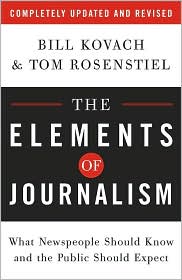
To answer the question, the committee conducted interviews, surveys, and other data gathering, then put their findings together in this book. The Elements of Journalism has since become one of the most well-respected and well-known books to articulate what, at its best, journalism should be. The book was re-released in 2007 with updated examples and a more thorough discussion of online media and how the internet continues to change the process and product of journalism.
According to the book, the elements of journalism are:
- Journalism’s first obligation is to the truth.
- Its first loyalty is to citizens.
- Its essence is a discipline of verification
- Its practitioners must maintain an independence from those they cover.
- It must serve as an independent monitor of power.
- It must provide a forum for public criticism and compromise.
- It must strive to make the significant interesting and relevant.
- It must keep the news comprehensive and in proportion.
- Its practitioners have an obligation to exercise their personal conscience.
- Citizens, too, have rights and responsibilities when it comes to the news.
The chapter I found most interesting was the one based on the principle “Its essence is a discipline of verification.” “Objectivity” and “balance” and “fairness” have become journalism buzzwords that are used to criticize journalists and media without a clear understanding of what they actually mean. The authors argue that today, objectivity is thought of as an aim of journalism when really objectivity should be a method of good journalism; objectivity should be “merely a voice, or device, to persuade the audience of one’s accuracy or fairness,” not the be all and end all standard of what is good journalism. Using objectivity, balance, and fairness as methods rather than aims forces journalists to do work verifying and confirming everything in their stories as a pursuit of getting as close to the truth as possible.
 I’m not doing a good job of explaining this which is too bad because the book does an admirable job of laying it all out there. I probably should have tried to write this review sooner so I could be more articulate about it. One of the strengths of this book is how thoroughly the authors explain their ideas and how much those ideas made me think about what many of my preconceived notions about journalism and journalism principles are. I think I can’t quite explain it because shifting my own view of what objectivity, balance, and fairness mean is something I am still working on.
I’m not doing a good job of explaining this which is too bad because the book does an admirable job of laying it all out there. I probably should have tried to write this review sooner so I could be more articulate about it. One of the strengths of this book is how thoroughly the authors explain their ideas and how much those ideas made me think about what many of my preconceived notions about journalism and journalism principles are. I think I can’t quite explain it because shifting my own view of what objectivity, balance, and fairness mean is something I am still working on.
Although I’m doing a review of this book, it’s not a book for a general audience, and doesn’t warrant a review so much as a discussion about what the different elements mean. Maybe if there is reader interest, I could do a series of posts exploring each of the elements in a little more detail and host some online discussions about them through this blog. I haven’t really thought about this at all, but leave a note in the comments if that sounds interesting, and if I get enough response I’ll put it on a list of topics to get to in the future 🙂
Bottom line: if you’re interested in journalism (as someone who practices, might practice, or just someone interested in the principles of journalism) then I think this book is both important and interesting. If those things don’t appeal to you, then obviously this book wouldn’t be something I suggest.
Links to Enjoy:
- An extended explanation of the Principles of Journalism by the Project for Excellence in Journalism
- The Committee of Concerned Journalists‘ website
Other Reviews:
If you have reviewed this book, please leave a link to the review in the comments and I will add your review to the main post. All I ask is for you to do the same to mine — thanks!

Comments on this entry are closed.
“Its practitioners must maintain an independence from those they cover.” This particular principle seems the most important to me. In my experience at a small circulation daily there was some wobbly space between getting too close to those covered and staying independent, especially when those covered were close friends to the publisher, who freely mixed business with social status, often to the detriment of the paper’s editorial content. I suspect my experience isn’t uncommon. I think there is a lot of fear out there, especially as print journalism tries to figure out what to do with itself as it responds to online media.
theexile: Yes, that one comes into play a lot too. I interned at two small papers (circulation less than 10,000), and could see how that would be an issue. Especially in small communities where people wear multiple hats, independence is a challenge.
I think this also comes into play in a different way with advertising — when you have a small ad base to begin with, it would be tempting to hold stories that might offend major advertisers to the paper. I haven’t seen that happen, but my experience is limited and I have no doubt it has.
And the switch to online media, that’s a whole different can of worms. Journalism is anxious right now, no doubt.